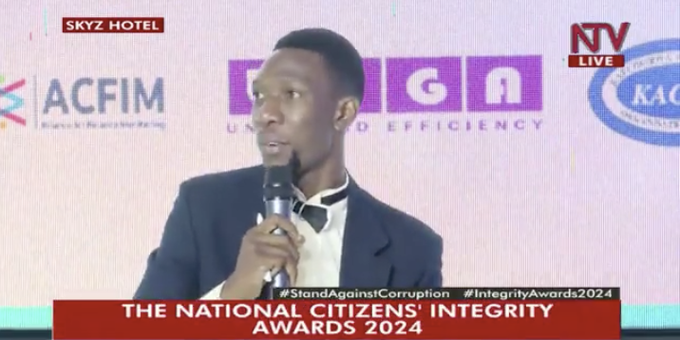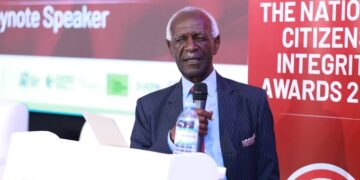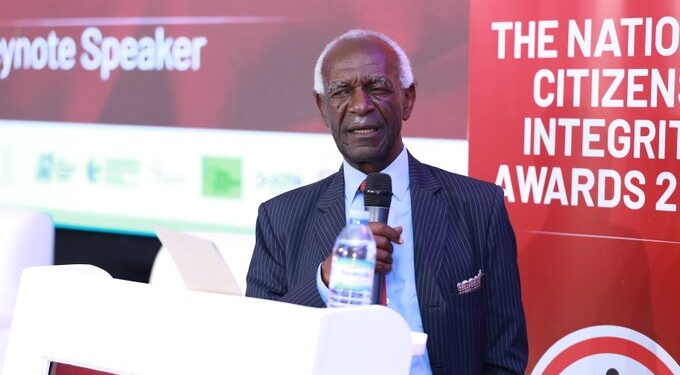Justice Canon James Ogoola, the former Principal Judge of the High Court of Uganda and a Justice of the COMESA Court of Justice in Lusaka, Zambia, says he never accepted a single bribe in his entire judiciary tenure.
He was speaking at this year’s National Citizens’ Integrity Awards held at Skyz Protea Hotel in Naguru on Wednesday night.
Hosted by ActionAid International Uganda in partnership with Anti-Corruption Coalition Uganda, Transparency International Uganda, Uganda Debt Network, Inspectorate of Government, Directorate of Ethics and Integrity and regional partners, the National Citizens’ Integrity Awards seek to promote the fight against corruption by recognising civil servants who have demonstrated a high level of integrity in serving their community.
Famously known as a man of integrity, Justice Ogoola is also the former chairperson of the Judicial Service Commission of Uganda.
During his keynote speech, Justice Ogoola shared a powerful reflection from 1998, when he first became a judge in Uganda. He recounted declining a “soda” from someone whose case he was presiding over, emphasising the importance of integrity in justice.

“When I first became a judge in Uganda’s judiciary in 1998—some of you weren’t even born then—cases started coming my way, and life had its own twists. One day, at my mother-in-law’s funeral, a man approached my wife with two envelopes. One was a condolence envelope. The other, suspiciously marked with “soda”, raised alarms in my mind. Why two envelopes for the same funeral? Why soda? I refused to touch it and decided to turn it over to the judiciary. But a second thought struck me—what if someone in authority, thirsty for ‘soda,’ took it for themselves?
So, I called for court on Monday and summoned the man, the press, and the lawyers involved in his case. Under the gaze of cameras and the press, I asked the man to confirm the envelope and its contents. Shaking with fear, he admitted everything. The next day, headlines across Uganda screamed: ‘Judge Rejects Soda.’ From that moment, not a single person dared offer me ‘soda’ beer, or water throughout my judiciary tenure. That is what we call integrity.”
Justice Ogoola noted that receiving an award is a profound invitation to the honourees to uphold these values and serve as an inspiration for others to follow. “We have turned the Ugandan motto upside down for God and my stomach. The public sector has transitioned into monsters of greed, grabbing and poaching. They have become a plague and an abomination to our country. Without remorse, we establish skyscrapers in our cities at night,” he stated.
“Corruption is the norm and integrity is the abnormal in our country. When arrested and arraigned for corruption we boost because, after days of arrest, we boast around on release,” he added.
Corruption scandals versus extreme poverty
Speaking on the same occasion, Dr Ayub Mukisa, the Executive Director of Karamoja Anti-Corruption Coalition, said the National Citizens’ Integrity Awards celebrate individuals and organisations that demonstrate honesty, transparency, and ethical leadership, upholding integrity in the marketplace.

“These awards honour those who inspire positive change in our communities. The fourth edition of the Integrity Awards highlights corruption in Karamoja, where rising scandals contrast sharply with extreme poverty. The awards aim to inspire citizens to take action against corruption, drawing attention to the stark disparity between stolen funds and the region’s dire need.”
On challenges involving citizens in the Integrity Awards, Dr Mukisa cited fear, intimidation, and a lack of confidence in their ability to make a difference.
He said the pervasive nature of corruption and widespread theft in Karamoja complicate efforts to tackle the issue effectively.
David Kizito from Transparency International Uganda, said empathy and the fight against corruption cannot go hand in hand.

“Ultimately, our goal is to instil hope in citizens, demonstrating that we are united in this effort,” he said.
Marlon Agaba, Executive Director of Anti-Corruption Coalition Uganda (ACCU), said the failure to address corruption within the NRM government in the 1980s, coupled with the lack of accountability for political leaders since the 1990s, has laid the foundation for the current challenges.
“We have lost integrity, hard work, and truthfulness as a country. While initiatives are often applauded, the real need is to promote integrity, especially among the younger generation, if we are to truly combat corruption, political will must be demonstrated to take decisive action.”

According to Marlon, corruption in Uganda has deep roots. “But how often do we study its history? Along the way, we’ve lost values like integrity, hard work, and gratitude. It’s time to reflect and reclaim them. We talk endlessly about fighting corruption, but what about promoting integrity?”
He said shifting the focus to the positive is just as important—especially for Uganda’s younger generation, noting that in a world of corruption, there are still people of integrity.
“Even the Bible says, “In every city, I have my hundreds.” Let’s find, recognise, and celebrate those who shine. Integrity must be nurtured. Events like these are vital for inspiring Ugandans, especially the youth, to embrace principles that build a better nation. Promoting integrity is not just an initiative; it’s a movement to inspire a culture that values honesty and hard work. Let’s honour those who lead by example.”









